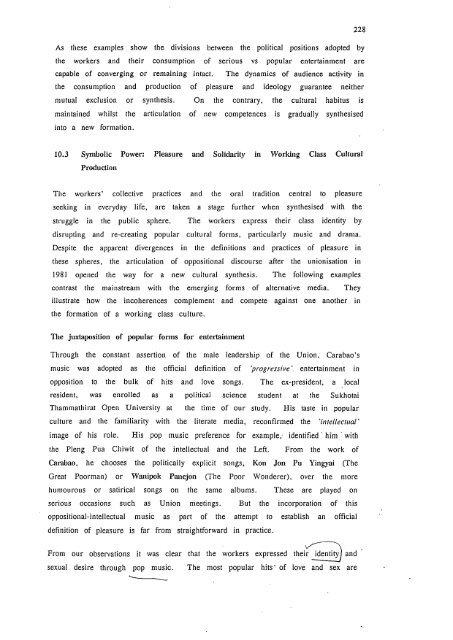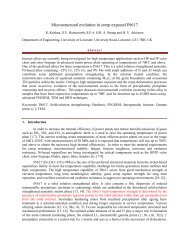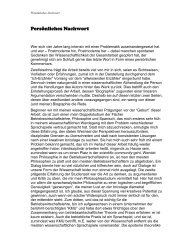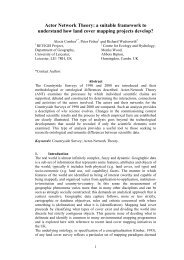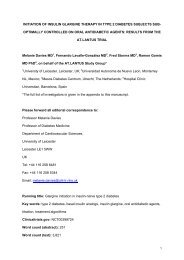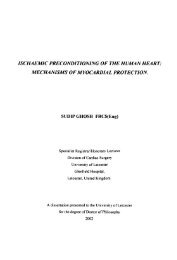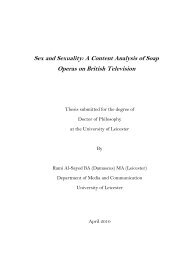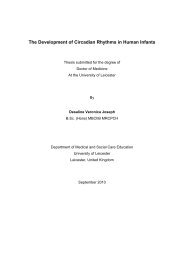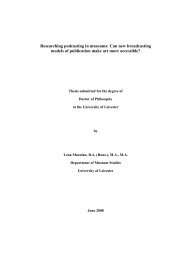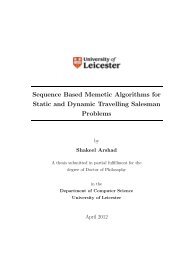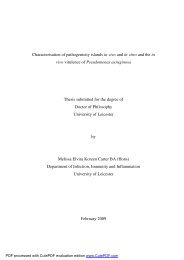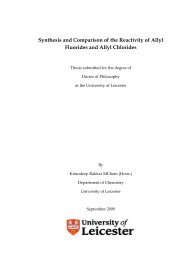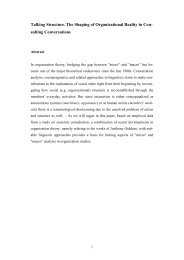iieiiei1eWrkers - Leicester Research Archive - University of Leicester
iieiiei1eWrkers - Leicester Research Archive - University of Leicester
iieiiei1eWrkers - Leicester Research Archive - University of Leicester
You also want an ePaper? Increase the reach of your titles
YUMPU automatically turns print PDFs into web optimized ePapers that Google loves.
As these examples show the divisions between the political positions adopted by<br />
the workers and their consumption <strong>of</strong> serious vs popular entertainment are<br />
capable <strong>of</strong> converging or remaining intact. The dynamics <strong>of</strong> audience activity in<br />
the consumption and production <strong>of</strong> pleasure and ideology guarantee neither<br />
mutual exclusion or synthesis. On the contrary, the cultural habitus is<br />
maintained whilst the articulation <strong>of</strong> new competences is gradually synthesised<br />
into a new formation.<br />
10.3 Symbolic Power: Pleasure aid Solidarity in Working Class Cultural<br />
Production<br />
The workers' collective practices and the oral tradition central to pleasure<br />
seeking in everyday life, are taken a stage further when synthesised with the<br />
struggle in the public sphere. The workers express their class identity by<br />
disrupting and re-creating popular cultural forms, particularly music and drama.<br />
Despite the apparent divergences in the definitions and practices <strong>of</strong> pleasure in<br />
these spheres, the articulation <strong>of</strong> oppositional discourse after the unionisation in<br />
1981 opened the way for a new cultural synthesis. The following examples<br />
contrast the mainstream with the emerging forms <strong>of</strong> alternative media. They<br />
illustrate how the incoherences complement and compete against one another in<br />
the formation <strong>of</strong> a working class culture.<br />
The juxtaposition <strong>of</strong> popular forms for entertainment<br />
Through the constant assertion <strong>of</strong> the male leadership <strong>of</strong> the Union, Carabao's<br />
music was adopted as the <strong>of</strong>ficial definition <strong>of</strong> 'progressive' entertainment in<br />
opposition to the bulk <strong>of</strong> hits and love songs. The ex-president, a local<br />
resident, was enrolled as a political science student at the Sukhotai<br />
Thanimathirat Open <strong>University</strong> at the time <strong>of</strong> our study. His taste in popular<br />
culture and the familiarity with the literate media, reconfirmed the 'intellectual'<br />
image <strong>of</strong> his role. His pop music preference for example, identified him with<br />
the Pleng Pua Chiwit <strong>of</strong> the intellectual and the Left. From the work <strong>of</strong><br />
Carabao, he chooses the politically explicit songs, Kon Jon Pu Yingyai (The<br />
Great Poorman) or Wanipok Panejon (The Poor Wonderer), over the more<br />
humourous or satirical songs on the same albums. These are played on<br />
serious occasions such as Union nheetings. But the incorporation <strong>of</strong> this<br />
oppositional-intellectual music as part <strong>of</strong> the attempt to establish an <strong>of</strong>ficial<br />
definition <strong>of</strong> pleasure is far from straightforward in practice.<br />
From our observations it was clear that the workers expressed thei ' itity and<br />
sexual desire through pop music. The most popular hits' <strong>of</strong> love and sex are<br />
228


